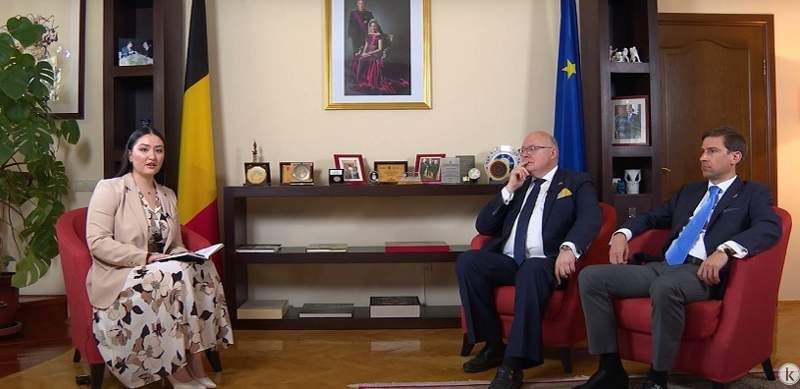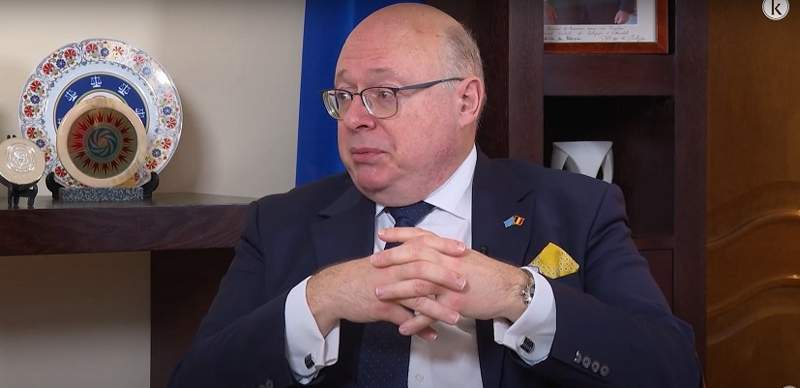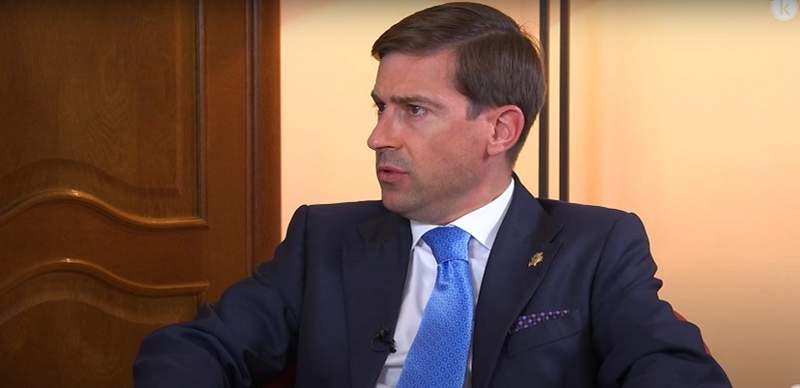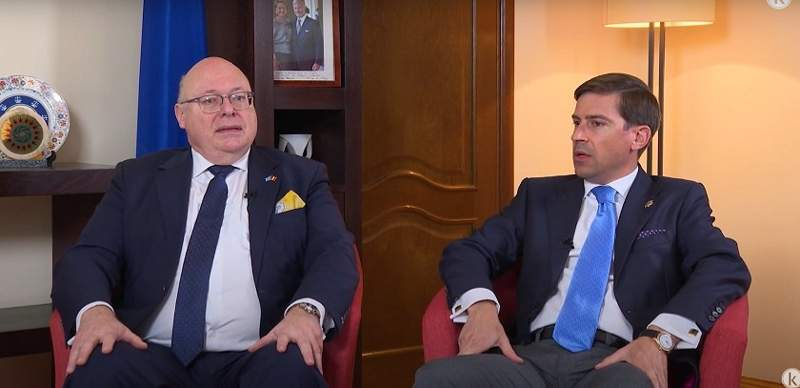Kazakhstan and Belgium: partners in growth and innovation

Belgium and Kazakhstan have built a strong relationship since 1992, marked by significant cooperation in finance, investment, and cultural exchange. In an exclusive interview with Kazinform News Agency, Ambassador Henri Vantieghem and Honorary Consul Denis Van den Weghe discussed the promising prospects of the Kazakh-Belgian Business Council, ongoing projects, and the future of bilateral cooperation.
At the first meeting of the Kazakh-Belgian Business Council in Astana, the ambassador of Kazakhstan in Brussels, Margulan Baymukhan, spoke about possible cooperation in the fields of logistics, energy, pharmaceuticals, digital technologies, and other industries. Tell us about the planned projects in these fields, particularly logistics and energy.
Henri Vantieghem: The collaboration between Belgium and Kazakhstan is mainly in the commercial and economic fields. I have an excellent relationship with His Excellency Margulan Baymukhan in Belgium, Ambassador of Kazakhstan to Belgium, and we work together to enhance this bilateral relationship. Actually, it's easy to work together because we also have the EPCA with the European Union, which is the General Agreement for Enhancing Partnership with Kazakhstan. Our work is in the framework of this EPCA from the European Union. When His Excellency President Kassym-Jomart Tokayev visited Belgium on November 21, he met our Prime Minister and proposed to establish a Business Council. We started to think about this proposal that was accepted by our Prime Minister, and we decided to organize it on the basis of the Chamber of Commerce.

For Belgium, we have the Benelux Chamber of Commerce, and for Kazakhstan, there is the Atameken International Chamber of Commerce. That's why I will share the words with the president of our Benelux Chamber of Commerce, who was in charge of organizing the first business council on June 22. We just had the second one on May 29th in Almaty. The first one was in Astana; now we're in Almaty. We hope that next year it might be in Brussels.
Denis Van den Weghe: As my function as the President of the Chamber of Commerce of Benelux, which I'm having next to my function as the Honorary Consul of Belgium, we have indeed held this Business Council last year, and this year was the second time. If we talk about the Trans-Caspian Corridor, the Middle Corridor, we have two big Belgian companies who are also in our chamber and who are actively working there to enable companies to use this Middle Corridor in the future. One of them is Jan De Nul. They have a big dredging project that will enable bigger ships to arrive at the ports of Aktau. Another company, Sarens, which has been in Kazakhstan for many, many years, besides their number one activity, which is cranes to lift very heavy material, is also in multimodal transport.
So if any goods come from Europe that are oversized and arrive at the port, then they need to be transported by road. Well, they can do that. So two of our main Belgian companies are linking East and West with their efforts on this project.
Henri Vantieghem: I think indeed we have a large field of cooperation in this establishment of the Trans-Caspian Corridor, but it's not the only one. We are also active in the critical raw material sector, and that's a memorandum of understanding that Kazakhstan has established with the European Union.

We try to exploit this raw material because it's a critical question for the European Union. We do not have these minerals and this ore in Europe, and we need partners. Kazakhstan and Central Asia as a whole are the partners that we really need to maintain the level of our industry in Europe. Having said that, it's a bilateral issue. Because having our own industry is profitable for Kazakhstan as well, we will establish a lot of investment to deliver the quantity we need of these critical raw materials.
Last year, there were two very big events in Brussels, not linked to Belgium directly but to the European Union. They happened in Brussels, the capital of Europe, of course. It was Critical Raw Material Week on November 22, and on January 23, we had this investors' forum for the Trans-Caspian Corridor. Because if we have a lot of goods to import from Asia and critical raw materials to move from Kazakhstan and Central Asia, we need to transport them. We need the Middle Corridor or Trans-Caspian Corridor in order to reach Central Asia more easily. So, it's a project that is sharing peace in the region, sharing development in the region, and sharing knowledge and technology in logistics. Having said that again, we said that pharmaceuticals are also a very important part of our exports to Kazakhstan. We have a very famous pharmaceutical industry in Belgium, and we share this technology with Kazakhstan with some investment as well. Some companies that are present in Kazakhstan are investing a lot in laboratories and the development of new medicines from Europe to Kazakhstan.
Currently, 76 companies with Belgian capital operate in the Kazakh market. In what areas do these companies operate? We talked about some of them in the first question. Are these Belgian businesses planning to expand their presence in Kazakhstan?
Henri Vantieghem: There is sometimes business secrecy because there is a lot of competition in the market. Kazakhstan is a very attractive market, so there are many companies willing to come to the Kazakh market. And I think we have plans, and our companies have very large plans for Central Asia, but they do not want to disclose all of their plans.
Denis Van den Weghe: Recently, actually last year, one huge Belgian corporation had a couple of billion euros in turnover per year worldwide. They are in food supplements. They have opened an R&D center in Almaty. They used to be very active in Russia, where they still have three factories because food is not sanctioned as of now. But anyway, they see the need to increase their presence in Kazakhstan and push more business towards Kazakhstan for the future, to be more stable in the region. So, this is one company that has made a big investment. We have another company that is looking at an investment in a big logistics terminal to serve its current and future clients to the level of Europe's standards—a high-tech logistics terminal.
This investment could reach $80 to $100 million in the next 10 years. Then, many companies have activities that do not require large capital investments. They have no big investments, but they are present here with their products. We have one chemical company in Atyrau; they have a storage facility that allows them to get their products to their clients quicker. So, as you can see, there are many different areas.
In pharmaceuticals, one of our companies had a worldwide vaccine, which was very successful. And besides this vaccine, which they were known for during the time of COVID, they have a very big range of products in their supply chain, which they have been selling here for many years successfully. As mentioned earlier by the Ambassador, there are other medical applications, for example, in nuclear medicine. We are worldwide leaders in nuclear medicine. Kazakhstan is making use of these technologies to treat its cancer patients. So, we have been present here for a couple of decades. But now, in the last couple of years, we see that there is an increase that will allow us to go to the next stage. The Chamber was created in 2021, and we really see in the last three years that so much more is happening than in the last 10 years, for example.
Honorary Consul, could you please tell us if there are any plans to open branches of Belgian banks in Kazakhstan?
Denis Van den Weghe: It's a very interesting question because we have different understandings of financial markets between Kazakhstan and Belgium, because historically we have big banks. I think we can probably count, on one hand, the big banks we have in Belgium. And in Kazakhstan, there are so many banks. I think there's more than 20, so the volatility on the market with many banks being active here is one thing. The other thing is that many of the Belgian banks are very conservative. At some point in time, when the European Union was increasing its size, some of the banks went to markets like Romania, Bulgaria, the Czech Republic, and Slovakia. Many have retreated from these markets already.

This is our, let's say, home market. This is Europe. We have retreated from these markets, so coming all the way to Central Asia, to put a bank here, it's impossible. At this moment in time, it's impossible. There's one international bank, Citibank, which is active here. They are servicing their big corporate clients. There's a certain set of criteria. For example, you need to have a minimum turnover per year here of 100 or 120 million dollars or euros, or you need to be part of their worldwide network of clients, etc. So even Citibank, which has all the possibilities, only service a couple of clients and even try to lower this number of clients to have big margins and not too much work and just be present here, no risk, no nothing. I find it very highly unlikely that in the next five years something will move, probably even 10 years, maybe 15 years, if we talk about Belgian banks.
What can you say about Belgium's view regarding Kazakhstan's investment policy and investment potential?
Denis Van den Weghe: The investment climate in Kazakhstan is very good. The government is always listening very carefully to companies, even going into individual requests from companies if the project is big or if the investment is big. The government in Kazakhstan is always taking a customized approach towards companies and projects, which are key to developing their economy further, to diversifying the economy, and to making sure that there is a good pool of companies creating a lot of jobs and wealth for the country.
In general, the legal system, the tax system—everything is quite stable. Of course, your country only gained independence a little bit more than 30 years ago, so you cannot say that all institutions are as strong as ours, which we've been building for more than 150 years. But it's a work in progress, and it's already very good. And I'm sure that if we look at the last couple of years, with some reforms taking place, it's only going to get better. And definitely within the wider region, even if we go further than Central Asia, it's probably one of the best investment climates around.
What do you think is Kazakhstan's biggest advantage?
Denis Van den Weghe: I think their openness has many separate advantages for separate industries. If you look at agriculture, of course, the huge land mass and the low cost of employees are a very big plus. If you look at renewable energies and the fact that there's so many days of sun here, of course it's better to have solar panels here than in Belgium, where we have so much rain, unfortunately. But as a country, for all industries combined, that's a very interesting question I've never heard. Maybe the people, because it's a melting pot here due to the horrors from Stalin's time when he sent all these different nationalities here. You have very interesting mixes of cultures and traditions, and all of this creates some openness. Because nobody is against a Korean, or a Tatar, or a Ukrainian, or a Russian, or a Jewish person. They're all living in the same community, and all of the Kazakhs have friends from all these communities. So already, if you take them as employees into your company, for example, a Belgian company setting up here, they are already open. They are already always, I guess, ready to go out-of-the-box thinking and doing something new. This is probably the main human capital in the country. And since I came in 2009 and since I moved in 2009, it's been 15 years. There were 16 million people when I arrived. Now we're at 20 million people, so the growth curve of the population is huge and this is only going to increase exponentially.
So the people and the human capital here have very big potential. I guess as a consumer market for our various companies from Belgium, the more mouths to feed and the more people to wear clothes and buy accessories, the more consumers you have for your industry.
What, in your opinion, does the future hold for our cooperation?
Denis Van den Weghe: There is never a point where you can say, ‘Now we're done’. We're never done. We're always continuously evolving as people, as countries, and as two countries together. There is a constant evolution. There is no revolution, only evolution. Kazakhstan is gaining importance nowadays because previously many European countries were active in Russia with huge natural resources available, and this is now gone. Meaning that you need to look for alternatives. We have so many industries we are developing in Europe. One of them is the car industry, where everybody needs to go from normal gasoline to electrical batteries. So where do we get the natural resources from then? It is highly likely that a large portion will come from Kazakhstan. So, Kazakhstan will play a more and more key role on the international stage in terms of the supply chain of natural resources to be able to make the transition from gasoline to electric cars.
In 2023 alone, Kazakhstan and Belgium held major events related to cultural exchange, like, for example, the screening of the film ‘Dos Mukhasan’ in Brussels. Recently, a Francophonie section was opened at the National Library in Astana with a number of books provided by Belgium. What can you tell us about the future of Kazakh-Belgian cultural exchange?
Henri Vantieghem: Well, I think that cultural exchange is very important for having good relations between people. And that's why I commend His Excellency Margulan Baymukhan, Ambassador of Kazakhstan to Belgium, for having such a high level of activity in Belgium and organizing so many events. I have to say that 25 or 30 years ago, Kazakhstan was not a name that was known in Belgium. Now everybody knows where it is and the importance of this country in Central Asia. So, it's a new development, and cultural relations are the basis of this new development for people-to-people relations.

Indeed, we have organized many manifestations and demonstrations for the 30th anniversary of bilateral relations. This year, we intend to have a chef coming from Belgium host two gala dinners in Astana. Last year, we organized one gala dinner in Astana and another one in Almaty with a very famous chef from Belgium, Yves Mattagne, who is known worldwide. You know, culture in Belgium is very important. We have many painters, musicians, and authors. But the main activity for Belgians is food. They eat a lot in Belgium, and they love very good-quality food. And that's why we intend to have this kind of cultural manifestation because, for us, it's indeed a cultural thing, a way of life in Kazakhstan. And it was very successful. I think, in cooperation with the Ministry of Foreign Affairs, we could develop these kinds of activities.
At the same time, every six weeks, I have a projection of a Belgian film here at the residence. And we have a public of about 25–30 people every time, and they can have access to Belgian cinema, which is very important these days because it is often described as surrealist cinema. So, all the stories told by filmmakers in Belgium are stories that are not always realistic, but some kind of dream of a special life. It might not even be a perfect life; it might be a different way of approaching the meaning of life. And they call it surrealism. And so I try to show that here at the residence to the Kazakh public. I am very pleased to say that we have a lot of young people coming here from Kazakhstan, from universities, from Nazarbayev University, from KazGUU, and from different schools, as well as from the French Alliance.
In Belgium, we have two official languages—actually three—but two main official languages: Flemish and French. There's also German, but German is for a smaller community in Belgium. So, we have activities in both languages here in the embassy as well.
Do you have any opinions or thoughts about the future of cooperation in education between our countries?
Henri Vantieghem: We are developing this cooperation between universities. Belgium has started with a structural agreement with Bolashak. We now have more than 300 Kazakh students who have studied in Belgium, and we are promoting the enhancement of this number year by year in the future. Bolashak is a very interesting program, and we try to provide the best education possible to the students coming to Belgium. You should know that the Belgian higher education system, including universities, is fully publicly funded. So, the tuition fee for registration at a university for a student is only €1,000 a year. So it's very low, and you can have an excellent education because at least three of our main universities are ranked in the international rankings. I think it's the Shanghai ranking of universities worldwide, and we are always among the top 101 universities in the world, for a cost that is extremely low. They are publicly funded, and even if they have a kind of private functioning system, we can manage to have this high level of education for a very affordable price. We also have some professors from Belgian universities coming to Kazakhstan. It's already the case, and we can maybe increase the number of professors coming here. But my feeling is that it's better for Kazakh students to go abroad and have an experience abroad than to pay for a professor from Belgium, Europe, or the rest of the world to come to Kazakhstan. It's a possibility; they will have more contact with students here, but the best way, I think, is to give students the experience of going abroad. I would also like to see some Belgian students coming here for special studies, for instance, language studies, Turkic language studies, or agriculture, because our agriculture is very well developed, but we do not have enough land; we are a small country in size, and here you have a lot of possibilities to develop agriculture. I think it would be great to exchange these experiences between our countries.
A recent article by President Kassym-Jomart Tokayev talks about middle powers and how they must come forward and renew vigor and declare their role not only as participants but also as responsible players on the global stage. Do you think the Middle East has the ability or capacity to really change the political agenda today?
Henri Vantieghem: I think that His Excellency President Kassym-Jomart Tokayev put his finger on the right issue for the 21st century. When I was a young student at university, it was a bipolar world. You had what was called the free world and then the Soviet world. Every single island in the Pacific, Fiji, was a part of this bilateral world. They had to connect with one or the other side of the world. This has totally vanished, and now we are in a multipolar world. In this multipolar world, I think that the middle powers have a role to play because we cannot leave world politics in the hands of a few countries. Actually, I can compare the situation in Kazakhstan with the situation in Belgium in the 19th century. We were a small country surrounded by empires. Northward, we had the British Empire across the Channel. Southward, we had the French Empire. And eastward, we had the German Empire. We were a quite developed, industrialized, and rich country, but we were between these empires, all with their own views on the future of the world. So, we could develop some kind of middle-power view even in the 19th century, surrounded by these empires, and I think that Kazakhstan is almost in the same situation now.
We started with the connection and integration in the Benelux. Because we were three countries in the middle of this central European part of Western Europe, surrounded by empires, there were the Netherlands, Belgium, and Luxembourg. We started with a kind of integration and cooperation between these countries, Benelux. I think it's a kind of model for Central Asia, an example for middle powers to have cooperation together and to make, not a bloc, but at least a coherent part of world politics. This allows us to have a voice on the world stage at the United Nations. A multipolar world also means multilateralism, which promotes international organizations, with the United Nations being the most famous and important one. If middle powers work together, they can balance the influence of superpowers in world politics.
Multilateralism is crucial for a peaceful future, and the middle powers have an important role to play in this. It's not only Kazakhstan but also Brazil, the European Union, and African countries that must be part of this multipolar world within the multilateral system.
Last but certainly not least, what do you think the future holds for our cooperation?
Denis Van den Weghe: There is never a point where you can say, ‘Now we're done’. We're never done. We're always continuously evolving as people, as countries, and as two countries together. There is a constant evolution. There is no revolution, only evolution. Kazakhstan is gaining importance nowadays because previously many European countries were active in Russia with huge natural resources available, and this is now gone. Meaning that you need to look for alternatives. We have so many industries we are developing in Europe. One of them is the car industry, where everybody needs to go from normal gasoline to electrical batteries. So where do we get the natural resources from then? It is highly likely that a large portion will come from Kazakhstan. So, Kazakhstan will play a more and more key role on the international stage in terms of the supply chain of natural resources to be able to make the transition from gasoline to electric cars.
Henri Vantieghem: I think it can only be a bright future because I don't see any obstacles between Kazakhstan and Belgium in the foreseeable future. We have the same interests, we have the same views, and we share an interest in multilateralism. We hope that peace will remain the basis of international relations in this century. Peace means respect and balanced relations, so we do not accept any violation of the Charter of the United Nations, which is the foundation of international law, and we respect international justice that must be applied to all countries without exception. Peace also requires responsibility, and we are responsible for maintaining and guaranteeing peaceful relations between nations. This is in the interest of Belgium, the Benelux, the European Union, and Kazakhstan and Central Asia as well.
Thank you for the interview!

